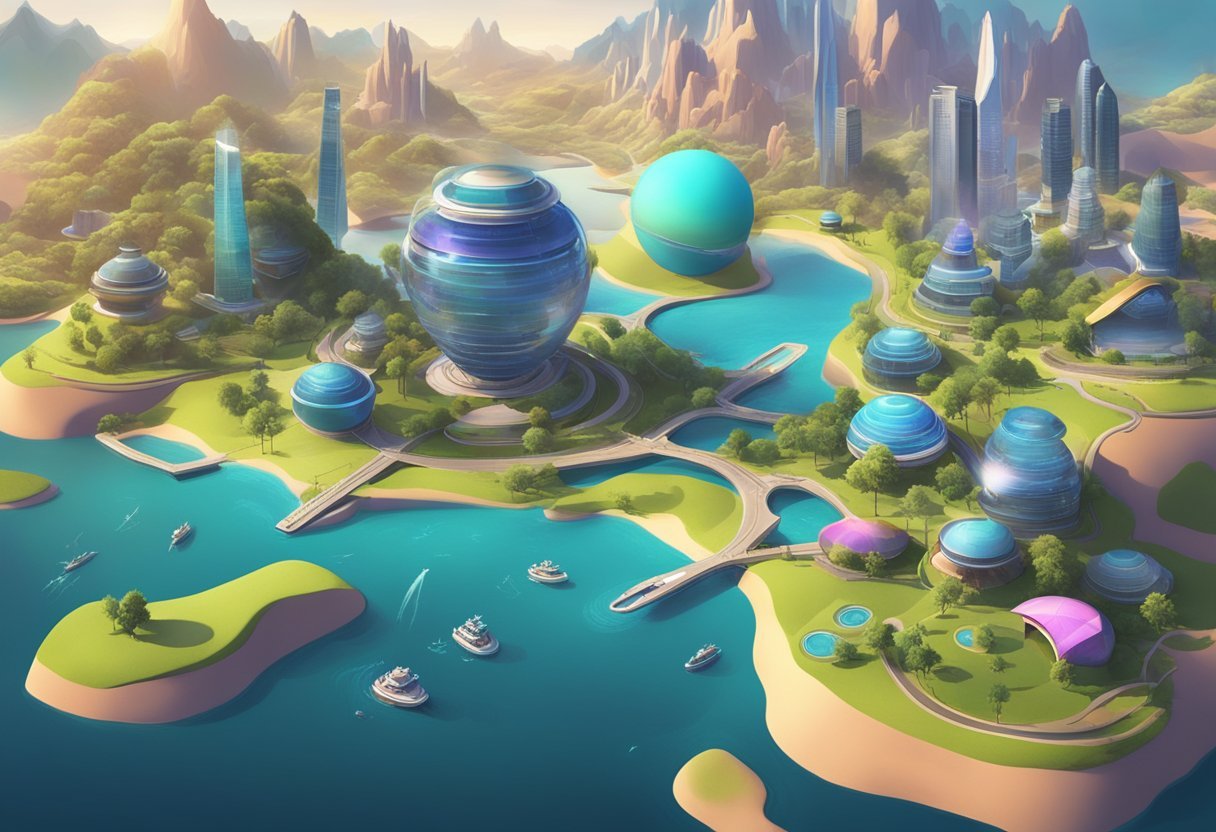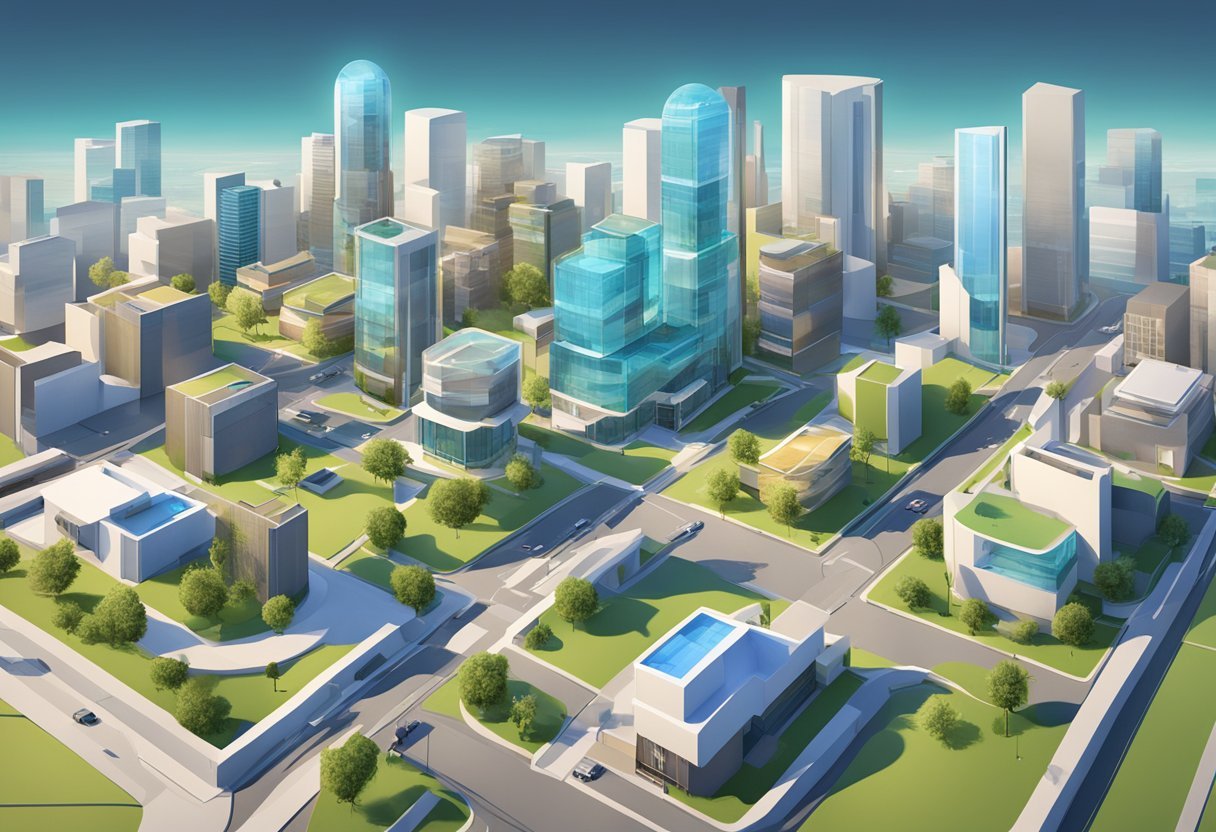Metaverse development tools are becoming increasingly important as more and more companies and individuals look to build immersive virtual worlds. The metaverse is a term used to describe a collective virtual shared space, created by the convergence of physical and virtual reality. It is a place where people can interact with each other, create content, and engage in a wide range of activities. Metaverse development tools are software applications and platforms that enable developers to create and manage these virtual spaces.
Top 20 Metaverse development tools
- Unity3D
- Unreal Engine
- Roblox Studio
- Decentraland SDK
- CryEngine
- Godot Engine
- A-Frame
- Mozilla Hubs
- SpatialOS
- High Fidelity
- Sumerian by AWS
- PlayCanvas
- JanusVR
- Vircadia
- AltspaceVR
- VirBELA
- Cryptovoxels
- Somnium Space
- Neos VR
- Open Wonderland
One of the most popular metaverse development tools is Unity, a game development engine that enables users to create immersive 3D worlds. Unity is widely used in the gaming industry and has been adopted by many metaverse developers due to its ease of use and powerful features. Another popular metaverse development tool is Unreal Engine, which is used by many high-end game developers to create sophisticated virtual worlds.
In addition to Unity and Unreal Engine, there are many other metaverse development tools available. Some of these tools are open-source, meaning that they are freely available and can be modified by anyone. Others are proprietary, meaning that they are owned by a particular company and are only available for a fee. Regardless of the specific tool used, metaverse development is an exciting and rapidly growing field that is likely to have a major impact on the future of entertainment, communication, and commerce.
Understanding Metaverse Development Tools

Metaverse development tools are the building blocks used to create and manage a metaverse, or a three-dimensional virtual world composed of multiple digital assets connected by links and protocols. These tools enable users to create, customize, and interact with these environments in real time. There are various tools and frameworks available for metaverse development, including both open-source and commercial software.
Introduction to Tools and Frameworks
Tools and frameworks are essential for metaverse development. They provide developers with the necessary resources to create and manage virtual worlds. The most popular tools and frameworks for metaverse development are Unity, Unreal Engine, Blender, and Ethereal Engine. These tools provide developers with a wide range of features and capabilities that allow them to create immersive and interactive virtual environments.
Open-Source Tools for Metaverse Development
Open-source tools are a popular choice for metaverse development. They are free to use and provide developers with access to a wide range of features and capabilities. The most popular open-source tools for metaverse development are Unity, Blender, and Rust language. These tools provide developers with the necessary resources to create immersive and interactive virtual environments.
Commercial Software for Metaverse Development
Commercial software is another option for metaverse development. While they may be expensive, they provide developers with access to a wide range of features and capabilities that can help them create immersive and interactive virtual environments. The most popular commercial software for metaverse development are Unity, Unreal Engine, and Ethereal Engine. These tools provide developers with a wide range of features and capabilities that allow them to create immersive and interactive virtual environments.
In conclusion, metaverse development tools are essential for creating and managing virtual worlds. Whether you choose open-source tools or commercial software, there are a wide range of options available to help you create immersive and interactive virtual environments.
Creating Virtual Worlds

Creating virtual worlds is a crucial aspect of metaverse development. It involves designing and building immersive 3D environments that users can explore and interact with. The process of creating virtual worlds involves several steps, including 3D world creation, user management, and voice- and video-based communication.
3D World Creation
3D world creation is the process of designing and building virtual spaces that users can explore and interact with. This involves using 3D modeling software to create 3D visualizations of virtual spaces, including buildings, landscapes, and other objects. The use of 3D modeling software allows developers to create highly detailed and realistic virtual environments that users can explore and interact with.
User Management in Virtual Worlds
User management is an important aspect of virtual world creation. It involves managing user accounts, permissions, and access to virtual spaces. User management is important for ensuring that virtual spaces are safe and secure, and that users are able to interact with each other in a respectful and productive manner.
Voice- and Video-Based Communication
Voice- and video-based communication are important features of virtual worlds. They allow users to communicate with each other in real-time, creating shared experiences that enhance the immersive nature of virtual spaces. Voice- and video-based communication can be integrated into virtual worlds using a variety of tools and technologies, including chat systems, voice chat, and video conferencing.
In conclusion, creating virtual worlds is a complex process that involves several steps, including 3D world creation, user management, and voice- and video-based communication. By using the right tools and technologies, developers can create immersive virtual spaces that provide users with shared experiences and a sense of community.
Metaverse and Blockchain

The metaverse is a virtual world where people can interact with each other and digital assets. Blockchain technology has the potential to revolutionize the metaverse by providing a secure and transparent way to manage digital assets.
Blockchain Technology in the Metaverse
Blockchain technology can be used to manage digital assets in the metaverse. Digital assets such as non-fungible tokens (NFTs) can be created and traded on the blockchain. The blockchain provides a secure and transparent way to track ownership and transfer of these digital assets.
One example of a blockchain-based metaverse is OMI. OMI is a virtual world built on the blockchain that allows users to buy and sell digital assets. The blockchain provides a secure and transparent way to manage these digital assets, which can be anything from virtual real estate to digital art.
Smart Contracts and NFTs
Smart contracts are self-executing contracts that are stored on the blockchain. Smart contracts can be used in the metaverse to manage the transfer of digital assets. For example, a smart contract can be used to automatically transfer ownership of an NFT when a certain condition is met.
NFTs are digital assets that are unique and can be bought and sold on the blockchain. NFTs can be used in the metaverse to represent anything from virtual real estate to virtual clothing. The blockchain provides a secure and transparent way to track ownership and transfer of these digital assets.
In conclusion, blockchain technology has the potential to revolutionize the metaverse by providing a secure and transparent way to manage digital assets. Smart contracts and NFTs can be used to manage the transfer of these digital assets. The use of blockchain technology in the metaverse is still in its early stages, but it has the potential to change the way we interact with digital assets in virtual worlds.
Future of Metaverse Development

As the metaverse continues to evolve, new technologies and tools are being developed to enhance the user experience and provide more seamless interactions. In this section, we will explore some of the emerging trends in metaverse development, including the use of artificial intelligence, hardware devices for metaverse interaction, and metaverse interoperability.
Artificial Intelligence in the Metaverse
Artificial intelligence (AI) is becoming increasingly important in the development of the metaverse. Machine learning and computer vision, in particular, are being used to create more immersive and interactive experiences. For example, AI can be used to create intelligent NPCs (non-player characters) that can interact with players in a more natural and realistic way. Computer vision can be used to track user movements and gestures, allowing for more intuitive and immersive interactions.
Hardware Devices for Metaverse Interaction
Hardware devices are also playing a crucial role in metaverse development. Devices like the HTC Vive and Oculus Quest are providing users with more immersive experiences, while the WebXR Device API is helping to standardize the development of web-based VR experiences. The Open Metaverse Interoperability Group (OMG) is working to create protocols for interoperability between different metaverse platforms, allowing users to seamlessly move between different virtual environments.
Metaverse Interoperability
Interoperability is a key challenge in metaverse development, as different platforms and environments often use different protocols and standards. The OMG is working to address this challenge by creating open standards for identity, inventory, and digital twins. Edge computing and spatial computing are also being used to create more seamless and responsive interactions, while holographic technology is being used to create more immersive and realistic environments.
In conclusion, the future of metaverse development is exciting and full of possibilities. With the continued development of AI, hardware devices, and interoperability standards, we can expect to see more immersive and interactive experiences that blur the line between the physical and digital worlds.
Frequently Asked Questions
What are some popular open source metaverse platforms?
There are several open source metaverse platforms available for developers. Some popular options include OpenSimulator, High Fidelity, and JanusVR. These platforms offer a range of features and capabilities for creating immersive virtual environments.
What skills are required for metaverse development?
Metaverse development requires a range of technical skills, including programming, 3D modeling, and game design. Developers should be proficient in programming languages such as C++, Java, and Python, as well as have experience with game engines such as Unity and Unreal Engine. Additionally, knowledge of 3D modeling software such as Blender or Maya is helpful.
Can you recommend any metaverse development frameworks?
There are several metaverse development frameworks available to developers. Some popular options include A-Frame, Babylon.js, and Three.js. These frameworks provide a range of tools and resources for creating immersive virtual environments.
What are some useful resources for metaverse developers?
There are several resources available for metaverse developers, including online forums, tutorials, and documentation. Some popular resources include the Unity Asset Store, the Unreal Engine Marketplace, and the OpenSimulator Wiki.
How do you program for a metaverse?
Programming for a metaverse requires knowledge of programming languages such as C++, Java, and Python. Developers should also be familiar with game engines such as Unity and Unreal Engine, as well as metaverse development frameworks such as A-Frame and Three.js. Additionally, knowledge of 3D modeling software such as Blender or Maya is helpful.
Are there any sample projects available for metaverse development?
Yes, there are several sample projects available for metaverse development. Many game engines and metaverse development frameworks offer sample projects and tutorials to help developers get started. Additionally, online forums and communities can be a great resource for finding sample projects and getting feedback on your work.




